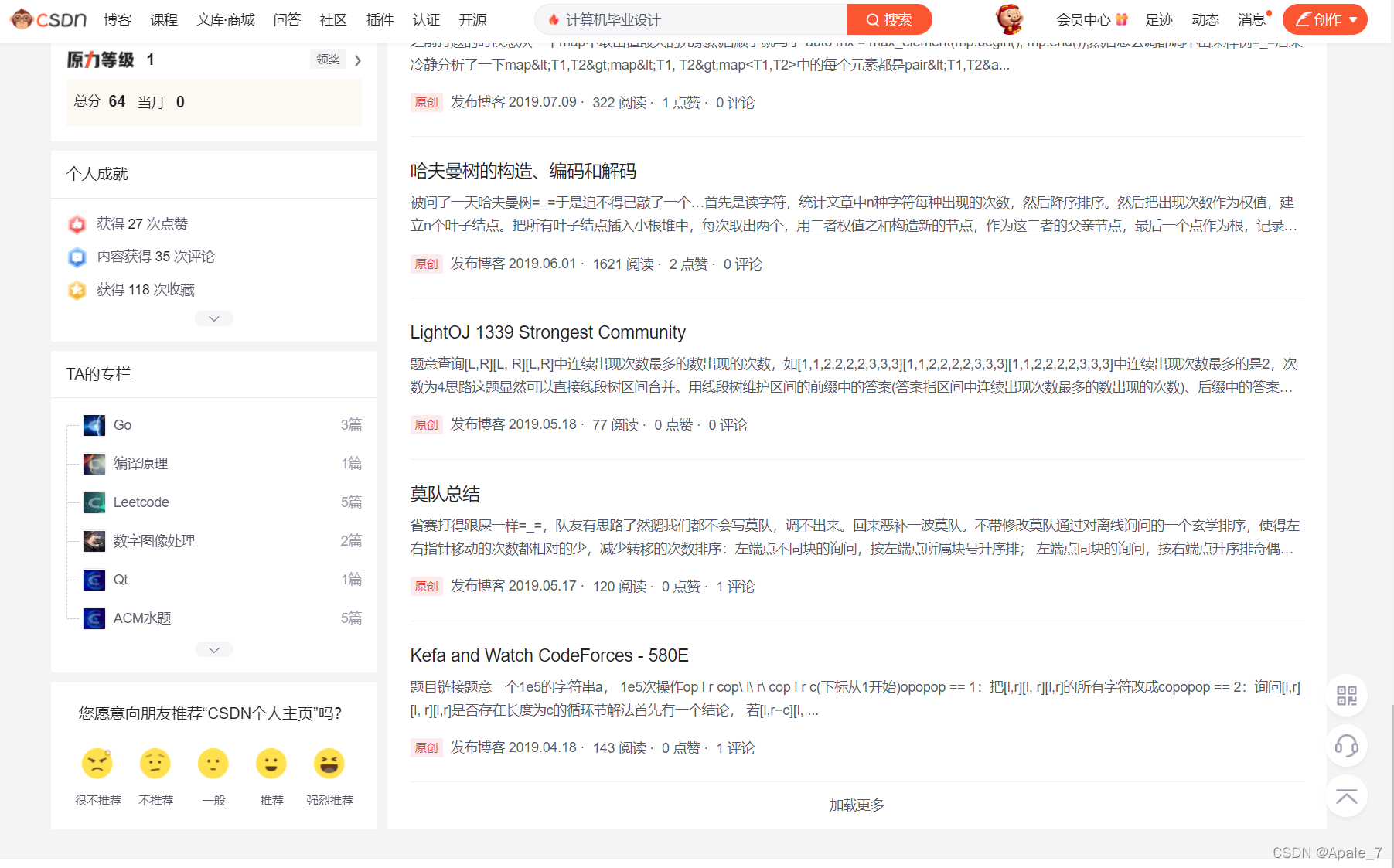不想继续在粪坑网站写博客了,于是自己用Vuepress搭了一个静态博客,配合github pages和服务器使用效果还挺不错。但之前写的博客基本全在CSDN,想导出来,人工一篇一篇复制就太累了,于是用go写了个爬虫自动把自己csdn上的所有文章的markdown源码导出并迁移到新站点上。这也应该是我CSDN上的最后一篇博客
- 个人主页https://blog.csdn.net/Apale_8可以获取博客列表
- 编辑页可以查看markdown源码
- 导出为统一的格式(标题、写作时间、分类、标签和内容等信息)
- 转换为VuePress的格式
博客的元信息基本都有导出,可以很方便地通过二次开发直接生成hexo、vuepress静态页面
- 导出个人csdn账号下,每篇博客的标题、内容、创建时间、分类、标签等信息
- 所有博客都输出到一个json文件中
- 无markdown源码的博客,content字段为html代码
见build.sh
- 编译
- 直接下载对应的release也行
- 填写conf.yml配置文件
- 运行
conf.yml必须与可执行文件在同一目录下
可以观察到博客列表是动态加载的,因此一定有接口


参数很简单,page和size,所以直接以page=1,size取一个>=自己博客数量的数字即可获取到所有博客的链接
package main
import (
"encoding/json"
"fmt"
"io"
"net/http"
)
const listApi = `https://blog.csdn.net/community/home-api/v1/get-business-list?page=%d&size=%d&businessType=lately&noMore=false&username=%s`
func getArticleList(username string) []Meta {
resp, err := http.Get(fmt.Sprintf(listApi, 1, blogNum, username))
if err := err; err != nil {
panic(err)
}
defer resp.Body.Close()
var respData ListRespData
b, err := io.ReadAll(resp.Body)
if err := err; err != nil {
panic(err)
}
if err := json.Unmarshal(b, &respData); err != nil {
panic(err)
}
fmt.Printf("读取博客列表成功, 总共: %d 篇\n", len(respData.Data.List))
return respData.Data.List
}
type ListRespData struct {
Code int `json:"code"`
Message string `json:"message"`
Data Data `json:"data"`
}
type Meta struct {
Type string `json:"type"`
FormatTime string `json:"formatTime"`
Title string `json:"title"`
Description string `json:"description"`
HasOriginal bool `json:"hasOriginal"`
DiggCount int `json:"diggCount"`
CommentCount int `json:"commentCount"`
PostTime int64 `json:"postTime"`
CreateTime int64 `json:"createTime"`
URL string `json:"url"`
ArticleType int `json:"articleType"`
ViewCount int `json:"viewCount"`
Rtype string `json:"rtype"`
}
type Data struct {
List []Meta `json:"list"`
Total interface{} `json:"total"`
}(代码里resp的几个结构体直接拷贝网页请求用工具生成即可)
博客内容要从编辑页面获取,因此需要登录
然后在编辑页面按f12找找接口,是可以找到getArticle这个接口的 https://bizapi.csdn.net/blog-console-api/v3/editor/getArticle?id=119971640&model_type=
但遗憾的是这个接口做了签名认证,读懂前端js的签名逻辑对我还是有点困难,遂放弃
github搜了一圈,发现有人用另一个不需要签名的接口爬过csdn markdown,应该是一个旧版的接口,但还能用 https://blog-console-api.csdn.net/v1/editor/getArticle?id=%s
于是成功地爬到了博客内容
需要注意的是,富文本编辑器和markdown编辑器的内容,在不同的字段,需要判断下
const (
articleApi = `https://blog-console-api.csdn.net/v1/editor/getArticle?id=%s`
)
func getArticle(meta Meta) Article {
articleData := getArticleContent(meta)
content := articleData.Markdowncontent
contentType := "markdown"
if content == "" { // 如果没有markdown内容, 就是用富文本编辑器编写的
content = articleData.Content
contentType = "HTML"
}
return Article{
Content: content,
Title: articleData.Title,
CreateTime: meta.CreateTime,
FormatTime: meta.FormatTime,
Categories: articleData.Categories,
Tags: strings.Split(articleData.Tags, ","),
ContentType: contentType,
}
}
func getArticleContent(meta Meta) ArticleData {
client := &http.Client{}
req, err := http.NewRequest("GET", fmt.Sprintf(articleApi, meta.URL[strings.LastIndex(meta.URL, "/")+1:]), nil)
req.Header.Set("cookie", cookie)
resp, err := client.Do(req)
if err := err; err != nil {
panic(err)
}
defer resp.Body.Close()
var respData ArticleRespData
if err := json.NewDecoder(resp.Body).Decode(&respData); err != nil {
panic(err)
}
return respData.Data
}
type ArticleRespData struct {
Code int `json:"code"`
Msg string `json:"msg"`
Data ArticleData `json:"data"`
}
type ArticleData struct {
ArticleID string `json:"article_id"`
Title string `json:"title"`
Description string `json:"description"`
Content string `json:"content"`
Markdowncontent string `json:"markdowncontent"`
Tags string `json:"tags"`
Categories string `json:"categories"`
Type string `json:"type"`
Status int `json:"status"`
ReadType string `json:"read_type"`
Reason string `json:"reason"`
ResourceURL string `json:"resource_url"`
OriginalLink string `json:"original_link"`
AuthorizedStatus bool `json:"authorized_status"`
CheckOriginal bool `json:"check_original"`
EditorType int `json:"editor_type"`
Plan []interface{} `json:"plan"`
VoteID int `json:"vote_id"`
ScheduledTime int `json:"scheduled_time"`
Level string `json:"level"`
CoverType string `json:"cover_type"`
CoverImages []interface{} `json:"cover_images"`
}
type Article struct {
Title string
CreateTime int64
FormatTime string
Categories string
Tags []string
ContentType string
Content string // 有markdown则存markdown,没有则存html
}简单转一下即可
输出的文件名用了随机串,因为中文名称在编译的时候有点问题
func toMarkdownForVuePress(a Article, path string) {
if path[:len(path)-1] != "/" {
path += "/"
}
content := fmt.Sprintf(vuePressFormat, a.Title, strings.ReplaceAll(a.FormatTime, ".", "-"), genTags(a.Tags...), genTags(a.Categories), a.Content)
os.WriteFile(path+uuid.New()+".md", []byte(content), 0o644) // 写入文件, uuid作为文件名,因为中文名可能有问题
}

